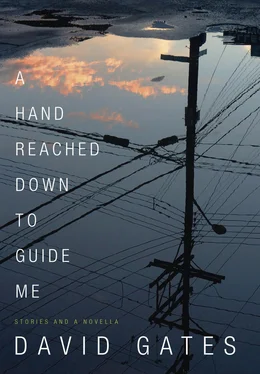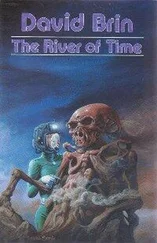David Gates - A Hand Reached Down to Guide Me
Здесь есть возможность читать онлайн «David Gates - A Hand Reached Down to Guide Me» весь текст электронной книги совершенно бесплатно (целиком полную версию без сокращений). В некоторых случаях можно слушать аудио, скачать через торрент в формате fb2 и присутствует краткое содержание. Жанр: Современная проза, на английском языке. Описание произведения, (предисловие) а так же отзывы посетителей доступны на портале библиотеки ЛибКат.
- Название:A Hand Reached Down to Guide Me
- Автор:
- Жанр:
- Год:неизвестен
- ISBN:нет данных
- Рейтинг книги:5 / 5. Голосов: 1
-
Избранное:Добавить в избранное
- Отзывы:
-
Ваша оценка:
- 100
- 1
- 2
- 3
- 4
- 5
A Hand Reached Down to Guide Me: краткое содержание, описание и аннотация
Предлагаем к чтению аннотацию, описание, краткое содержание или предисловие (зависит от того, что написал сам автор книги «A Hand Reached Down to Guide Me»). Если вы не нашли необходимую информацию о книге — напишите в комментариях, мы постараемся отыскать её.
magazine anointed “a true heir to both Raymond Carver and John Cheever.”
A Hand Reached Down to Guide Me Relentlessly inventive, alternately hilarious and tragic, always moving, this book proves yet again that Gates is one of our most talented, witty and emotionally intelligent writers.
A Hand Reached Down to Guide Me — читать онлайн бесплатно полную книгу (весь текст) целиком
Ниже представлен текст книги, разбитый по страницам. Система сохранения места последней прочитанной страницы, позволяет с удобством читать онлайн бесплатно книгу «A Hand Reached Down to Guide Me», без необходимости каждый раз заново искать на чём Вы остановились. Поставьте закладку, и сможете в любой момент перейти на страницу, на которой закончили чтение.
Интервал:
Закладка:
I prayed again, sitting out there—you must be thinking I’m not too tightly wrapped, unless you’re a Jesus case like my brother, in which case you’re thinking Grace must be at work, even in this lost bitch’s soul —and this time I prayed that I would never hurt him. I probably thought this made me a good person, that’s how fucking stupid I was. I didn’t get any more specific than never hurting him, which was like lying to your shrink. I don’t go all the way with my brother, who seemed to feel, oh, a little bummed out by, but basically okay with, my father being in hell for ever and ever and ever, I suppose because that was God’s inscrutable will, which wasn’t for him to scrute. But I do believe this much: sooner or later, and in my case I hope later, you’ll have to look at exactly who you were and everything you did, and it’s going to be a shitshow.
My husband came out, with his hair wet and a glass of single malt in each hand—and what happened after that? We went in and had dinner? Watched a movie? Had orgasms in each other’s company, not to put it untenderly? Whatever it might have been, it was surely nothing we hadn’t bargained for.
4
My husband’s hilltop overlooked a wide part of the Hudson that the old-timers used to call Henry’s Pond, and the Indians had called I forget what—he had a whole section of books on local lore. Downriver, a suspension bridge crossed a narrow bend; in the days before the bridge, people would holler across the narrows for the ferry to come. From the deck or through the glass wall of the living room, you could look a mile across the water at that rocky lump of mountain, in whose gray cliffs rattlesnakes supposedly nested.
The first settlement, at the narrows, was long gone; they’d built the present town in the early 1800s, a single street of brick and wooden buildings, intersected by Broadway, the old Route 9, which sixty miles south became the real Broadway. The businesses there now had, by ordinance, royal blue wooden signs with gold letters hanging over the sidewalk. Main Street led down to the Metro-North tracks and dead-ended at the water, where it looped around a green-painted iron tank, planted with geraniums every spring by the chamber of commerce. On weekends, out-of-towners swarmed the antique shops, the nouveau penny-candy store and the soi-disant organic bakery; my husband called it “Olde Quaintsburgh”—I’m inferring both the e and the h . I never told him that I’d once done a feature about it for a section of the paper called “Delightful Destinations.”
We avoided the place, except for a sports bar where we’d go one night a week in the summer to watch baseball and eat linguine with sausage. We could have driven twenty miles to a mall with a multiplex, but he refused, as he put it, “to report for entertainment,” so a couple of nights a week we’d watch a movie at home —film was another forbidden affectation—first on VHS, later on DVD. The other nights we read: him with his Dickens or his P. G. Wodehouse or his books of Shakespeare criticism—after admiring Shakespeare: The Invention of the Human , he wanted to know all about Bloom’s class—while I took down this or that from his shelves. He read all of Jane Austen aloud to me. Every week or two we’d drive to the city, to Lincoln Center or BAM, then a late supper at a place he knew on Seventy-First Street or a piece of cheesecake at Junior’s, or simply a “civilized” dinner for two at places where waiters and bartenders pretended to remember him: Café Loup, Da Silvano, the Odeon. He bought me a black Audrey Hepburn dress for the opera; he wore an Armani tuxedo, which still fitted him after twenty years, and cowboy boots. Every Thursday night he played at the restaurant, with a pianist and a drummer. I’d go along sometimes to get out of the house, but it just sounded like a lot of notes to me, so I’d watch his long fingers for a while, spider-walking up and down the neck of his big bass, then open whatever book I’d brought and end up drinking too much. He was good about putting on a classic rock station during the drive home and letting me sing along.
—
The floors in the new house had come out of a barn in New Hampshire, pine boards a foot and a half wide that were oiled and buffed to a fare-thee-well—he had principles about polyurethane—and I wasn’t to walk on them in what he called spike heels. Underneath were tubes for radiant heat; even in winter, the wood felt warm under my bare feet. Three walls of the living room were bookshelves, with just enough space for the Diebenkorn and a tarnished brass tuba—which mustn’t be confused with a sousaphone, and which he said was the most beautiful object ever made by the hand of man, though he also applied this designation to an old automobile called a Cord, his Bang & Olufsen turntable, the Verrazano Bridge, the Japanese flag he hauled out every Fourth of July, and an egg slicer. We went down to ABC Carpet, where he dropped forty-five thousand dollars on antique rugs. I watched the salesman profiling him: the gray hair and trimmed beard—he’d begun growing it during the construction; I suppose the jawline had been bothering him too—and the jeans and blue denim shirt and the younger woman. After he’d presented his card and signed the slip, he shook hands not only with the salesman but also with the two underlings who’d pulled the rugs we’d chosen from the heavy piles and laid them out on the showroom floor.
For that much money, 187 children could have been operated on for cleft palate, with $120 left over. Did you know that one in ten such children will die before their first birthday? I found this out the other day, on operationsmile.org, and did the math. This was something I never knew to consider when I got out of my side of the bed, with its Dux mattress, and put my piggies down into that soft wool. I must be singling out the rugs to obsess over because they were on a human scale. Like the way we’d convey the magnitude of this or that calamity to the readers of Newsweek: Every day, a town the size of TK , the writer would write, and the researcher would look up places in the heartland with however many thousand people and pick one with a leafy name.
Beneath the showy part of the house was a basement with a laundry room, an exercise room, a music room (complete with baby grand piano) and a guest suite: bedroom, sitting room, bathroom, a coffeemaker, a microwave and a mini-fridge, with a private entrance giving onto the driveway. He called the guest quarters “the Bunker,” or “the Black Hole of Calcutta,” and, after Iraq, “Abu Ghraib.” All those little things of his—not jokes, exactly; I don’t know what the word would be—like calling Verdi “Mean Joe Green,” or Lake George “Lago di Giorgio,” or a futon a “futilitron,” or pronouncing herpes “air-pess.” When Target stores appeared, he called them “Tar-zhay” until everybody else started doing it. The house had no garage: he said it would clutter up the design, though of course our cars cluttered up the driveway, and in the winter we had to clear snow and scrape windshields.
When we moved in, he bought all new furniture, dishes, silver and whatnot. Except for the books—his father’s library merged with his—he put most of the stuff from Rhinebeck in a storage unit, in case his daughter might want it someday. For all I know, it’s still there.
She never paid her farewell visit to the old house—she told him it would be too sad—but she did come to see the new place. “Seriously?” she said as we got out of the car.
“Do I take that as a compliment?” he said.
“It looks like it’s about to take off and fly.”
“You hate it.”
“ No ,” she said. “It’s like where somebody famous would live. Actually I guess you are sort of famous.”
Читать дальшеИнтервал:
Закладка:
Похожие книги на «A Hand Reached Down to Guide Me»
Представляем Вашему вниманию похожие книги на «A Hand Reached Down to Guide Me» списком для выбора. Мы отобрали схожую по названию и смыслу литературу в надежде предоставить читателям больше вариантов отыскать новые, интересные, ещё непрочитанные произведения.
Обсуждение, отзывы о книге «A Hand Reached Down to Guide Me» и просто собственные мнения читателей. Оставьте ваши комментарии, напишите, что Вы думаете о произведении, его смысле или главных героях. Укажите что конкретно понравилось, а что нет, и почему Вы так считаете.











